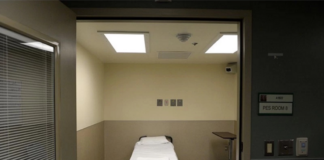Tag: mental health policy
Bernie Sanders’ ‘Revolutionary’ Disability Plan Opposes Expanding Involuntary Treatment
Candidate Bernie Sanders' 'disability rights as civil rights' plan is distinctive in its explicit inclusion of people with psychiatric disabilities and diagnoses, an orientation that runs counter to prevailing policy discourse in the U.S.
Tensions in Mental Health Care in China: An Interview with Zhiying...
Anthropologist Zhiying Ma explores mental health care in China, including tensions between Western psychiatry and socially-oriented local frameworks.
Public Purse a Cash Cow for Pharma: Could Taxpayer Dollars Be...
In Oregon, which has only about 1% of the national population, medical expenditures for psychiatric drugs in fiscal year 2017-2018 were $82.2 million for adults, and another $8.7 million for youth. Every advocate in the US should request these figures from their state Medicaid offices.
“The Angry Consumer”: Embracing Difficult Conversations
Judgments of the so-called ‘angry consumer’ deeply reinforce divisions within mental health policy and services. The only way we can engage in meaningful co-production is not to gloss over histories of collective exclusion and disempowerment and all the pain and anger that goes with it, but rather to validate and work through difficult emotions.
England’s Mental Health Experiment: No-Cost Talk Therapy
From The New York Times: England is in the midst of a unique national experiment, an initiative that provides open-ended talk therapy free of charge...
Ban on Mentally ill People Buying Guns Wasn’t Evidence Based
From The Washington Post: Republicans are moving to reverse a ban instituted by the Obama administration that prevented certain people from buying guns based on...
The Helping Room
Every culture has its share of individuals who break down in bewilderment. People who hallucinate, behave beyond norms, seek to die, think in strange ways.
The Mental Health Reform Act of 2016 (SB 2680) Would Be...
There is indeed a crisis in the mental health business. The crisis derives from psychiatry's spurious and self-serving premise that all significant problems of thinking, feeling, and/or behaving are brain illnesses that are correctable by psychiatric drugs.
Dear Boston Globe, Part IV: A Taste of Your Own Medicine
The Boston Globe paints a picture (in the vivid way that they so love to do) that pins the system’s decline primarily on budgetary issues, but there is more than one way for a system to be ‘broken.’ In fact, where the Globe goes most wrong in their latest piece, ‘Community Care,’ is in their failure to adequately recognize that the system has always been broken in one way or another in this country.
A Diluted Murphy Bill Clears the House and Goes to the...
Organized psychiatry, committed irrevocably and wholeheartedly to drug pushing and to their corrupt and corrupting relationship with pharma, simply will not countenance the fact that their primary product is fundamentally flawed and destructive. So they hire a PR company; they fund and lobby politicians; they parrot slogans; and they encourage one another to ever-increasing heights of self-congratulation. But they will not commission a definitive study to clarify and assess the scale of this problem once and for all. And the reason for this inaction is because they know that it would be bad for business. It would "cause a lot of people to stop taking their medications."
The Murphy Bill, HR 2646 — a Heinous Piece of Legislation...
The National Coalition for Mental Health Recovery is calling upon all people of like minds, who care about individuals who need mental health services, to ACT. It is urgent. Please call your representative in the House of Representatives to vigorously oppose HR 2646 on Tuesday, July 5, 2016. And, call your Senator to insist that the Senate reject any amendments or changes to mental health legislation from the House by Friday, July 8, 2016. For more information about this Call to Action, please click here.
A CALL TO ACTION: The Murphy Bill Passed the E&C Committee but...
As you read this, people with lived experience all around the country are mobilizing to educate our federal legislators about why the Helping Families in Mental Health Crisis Act (H.R. 2646) should be defeated. Education is the key. As executive director of the National Coalition for Mental Health Recovery, I am issuing a call to action. We need to ramp up our efforts before this backward piece of legislation becomes law. We need to get in touch with our legislators and their staffs, contact the media, make some noise! We need to exercise the proverbial strength in numbers. And we need all of this now!
Mental Health Treatments Top List of US Healthcare Spending
According to new research, the United States spends over 200 billion annually on treatment and hospitalization for mental health issues, exceeding spending on heart...
“We Need REAL Change in Mental Health Policy, Not the Illusion...
David Shern, from Johns Hopkins University, writes that the latest mental health “Murphy bill” in Congress is “an expansion of the approaches that got us into our current difficulties.” “Early intervention and prevention, assessable and patient-focused services with a rehabilitation orientation and increased funding for the community supports needed for successful recovery are the tickets to system improvement.”
“Saving Congressman Murphy from Fraudulent Information”
Dennis Embry, a clinical psychologist and government consultant on mental health, shares a letter he sent to congressman Murphy warning him about how he may have been misled concerning his mental health bill. “I am specifically writing you about erroneous, false information you’ve been given about the National Registry of Evidence Base Programs and Practices. That erroneous information is likely to cause serious problems, which have been withheld from you.”
Despite “Flurry of Interest,” Ketamine Remains Unproven For Depression
In 2014, then National Institute of Mental Health (NIMH) director, Thomas Insel, speculated that ketamine “might be the most important breakthrough in antidepressant treatment in decades.” A recent review of the research suggests that while ketamine may produce a rapid short-term improvement in depression, the effect is short-lived and the potential for addiction and dependence warrants considerable caution.
Compulsory Treatment Laws in Germany’s Psychiatric Wards
The science magazine RUBIN provides an update on patients’ rights to refuse treatment in Germany's psychiatric wards. “In psychiatric wards in Germany, patients used to be medicated indiscriminately against their will if doctors considered it necessary. It was only after a Federal Constitution Court ruling a few years ago that patient autonomy has been strengthened.”
NIMH: RAISE Study to Have Immediate Clinical Impact
In a Science Update, the National Institute of Mental Health (NIMH) reports that Medicaid services is already taking steps to implement “coordinated specialty care” (CSC) in response to the RAISE study released last week. “The RAISE initiative has shown that coordinated specialty care for first episode psychosis is better than the standard care offered in community clinics. However, covering the cost of coordinated specialty care can be challenging. When Medicaid agrees to pay for effective treatment programs, patients in need benefit.”
Massive Number of Antidepressant Meta-Analyses Biased By Industry
A massive number of meta-analyses of antidepressant clinical trials have financial conflicts of interest and are unduly influenced by pharmaceutical companies, according to a review to be published in an upcoming issue of the Journal of Clinical Epidemiology. Researchers also found that meta-analyses with industry ties almost never report any negative findings in their abstracts.
“Maybe Oregon Shooting and Others Aren’t About Mental Illness”
Matthew Cooper, writing for Newsweek, reports that despite the preponderance of political rhetoric about “mental illness” after mass shootings, a review of the research suggests that the connection between mental health and gun violence is dubious.
John Oliver on Mental Health
On his weekly HBO show, Last Week Tonight, host John Oliver argues that the tendency to discuss mental health in the wake of a mass shooting is "deeply misleading."
Defeating Goliath: Mental Health is a Social Justice Issue, and People...
While I have lived just a few miles away from the Capitol for the last fifteen years, I have been unsure about getting involved in legislative advocacy. I’ve been intimidated by the complexity of the legislative process, and more inclined to leave it up to others who I perceive as having more experience than me. And honestly, I haven’t felt very hopeful about effecting change. My cynicism had turned to “learned helplessness.” And then along came a mental health bill so destructive, so regressive, that I had to step out of my uncomfortable comfort zone.

















